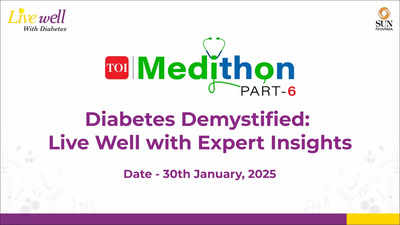
Diabetes is a chronic disease that affects millions worldwide, leading to severe health complications if not managed properly. It occurs when the body either does not produce enough insulin (Type 1 diabetes) or cannot effectively use insulin (Type 2 diabetes). Without proper control, diabetes can result in heart disease, kidney failure, nerve damage, vision loss, and other life-threatening conditions.
Raising awareness about diabetes is crucial for prevention, early diagnosis, and effective management. Many people remain undiagnosed until complications arise, making education about symptoms, risk factors, and lifestyle changes essential. A healthy diet, regular physical activity, weight management, and monitoring blood sugar levels can significantly reduce the risk of complications.
To create awareness about diabetes and the complications associated with it, TOI had organised a medithon which had several experts in attendance. The program aimed to educate people on the risks, causes and prevention of the silent epidemic that already has affected billions of people across the worldwide and has millions in pre-diabetic condition.
The TOI Medithon Part 6 was held in four sessions, and each session highlighted a separate aspect of diabetes.
First session: Diabetes – Risk factors and complications
In the first session of the TOI Medithon Part 6, Dr. Jasjeet Singh Wasir, MD, Director of Endocrinology and Diabetes at Medanta, Gurugram, highlighted the risks associated with diabetes, stressing the importance of timely treatment to prevent complications. He emphasized that diabetes impacts the body’s vital organs.
Dr. Rohit Kapoor, MD, FACP, FACC, FRCP, Internal Medicine Director, Carewell Heart & Super Specialty Hospital, Amritsar and Dr. Ashish Saxena, MD, FRCP, FIAE, PGDD, Consultant Internal Medicine, Diabetes & Non-Invasive Cardiology, Diabetes and Heart Centre & Delta Heart Centre, Ludhiana discussed how diabetes significantly affects the heart and kidneys.
The experts underscored that diabetes increases the risk of severe complications, including heart disease, stroke, kidney failure, nerve damage, and vision loss.
Second session: Live well with Diabetes – Getting to know about Diabetes
In the second session, experts shared basic and insightful information around diabetes and how to identify it.
Dr. Alka Gandhi, Consulting Diabetologist & Founder, Aayushi Advanced Diabetes Care Clinic, Mumbai highlighted the rising prevalence of diabetes in India, explaining that the condition occurs when blood glucose levels increase due to insufficient insulin production or ineffective insulin use.
Dr. Shefali Karkhanis, Consultant Diabetologist & Co-Director, Karkhanis Super-specialty Hospital, Thane emphasized the impact of diabetes on women’s health, noting that hormonal and psychological differences between men and women influence the disease’s diagnosis and progression.
Dr. Ami Sanghvi, Director & Consultant Diabetologist, Sanghvi Eye & Diabetes Care Centre, Mumbai shed light on common symptoms of diabetes, including increased thirst, frequent urination, excessive hunger, fatigue, slow-healing wounds, and itching in private areas.
Third session: Live well with Diabetes – Prevention, management and reversal
The third session comprised experts who shed light on key aspects of diabetes management which are prevention and reversal.
Dr. Ghanshyam Agrawal MD, DM Endocrinology. Consultant Endocrinologist & Diabetologist, Lucknow described diabetes as a multifactorial disease, emphasizing obesity as a major risk factor. He highlighted that lifestyle changes, including a healthy diet and regular physical activity, can help reduce the risk of diabetes. He also advised against excessive consumption of sweets, refined flour (maida), and fiber-deficient foods.
Dr. Jayakrishnan C Menon, MD, DM (Endocrinology). Assistant Professor in Endocrinology, Jubilee Mission Medical College, Thrissur reinforced the significance of diet in diabetes prevention, citing numerous studies that highlight its crucial role.
Dr. Kiran Kumar Pasam, MD, DM Endocrinology. Consultant Endocrinologist, AIG Hospitals, Hyderabad stressed the importance of dietary management in controlling diabetes. He referred to the recently released ICMR guidelines, which recommend increasing the intake of low-GI foods, consuming whole foods, and reducing processed food consumption.
Fourth session: Diabetes & Obesity
The last session focused on a silent epidemic and its association with diabetes: obesity.
Dr. Om J Lakhani, MD, DNB Endocrinology. Consultant Endocrinologist, Zydus Hospital, Ahmedabad explained that obesity is a measurable condition, commonly assessed using Body Mass Index (BMI), which serves as a simple and effective tool for defining obesity.
Dr. Harsh Durgia, MD, DM Endocrinology. Consultant Endocrinologist, Dr. Harsh’s Endocrine & Diabetes Center, Rajkot highlighted various contributing factors to obesity, emphasizing that a sedentary lifestyle and calorie imbalance play a significant role in its development.
By promoting awareness, individuals can take proactive steps toward a healthier lifestyle, reducing the burden of diabetes on individuals and healthcare systems. Early intervention and informed choices empower people to live healthier lives, making diabetes a manageable condition rather than a life-threatening disease.
Watch TOI Medithon here

















